2022年外研版中考英语二轮复习话题七 旅游与交通、历史与社会课件
文档属性
| 名称 | 2022年外研版中考英语二轮复习话题七 旅游与交通、历史与社会课件 | 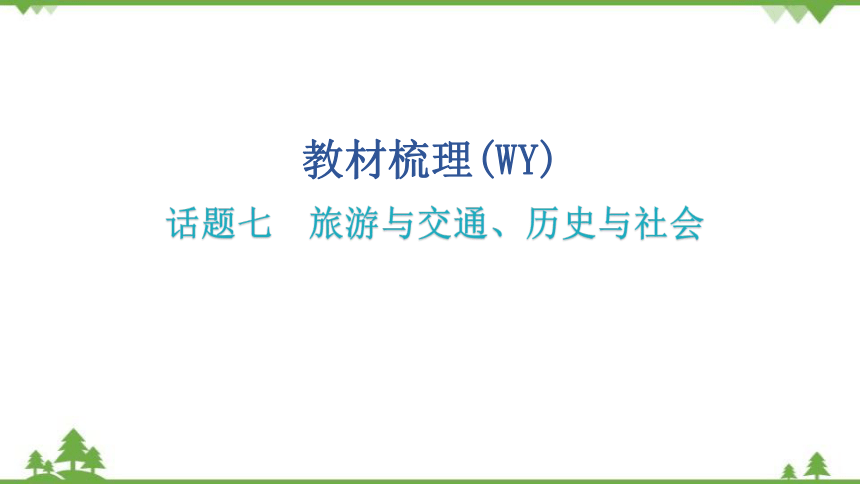 | |
| 格式 | pptx | ||
| 文件大小 | 384.0KB | ||
| 资源类型 | 教案 | ||
| 版本资源 | 外研版 | ||
| 科目 | 英语 | ||
| 更新时间 | 2022-05-26 20:10:14 | ||
图片预览

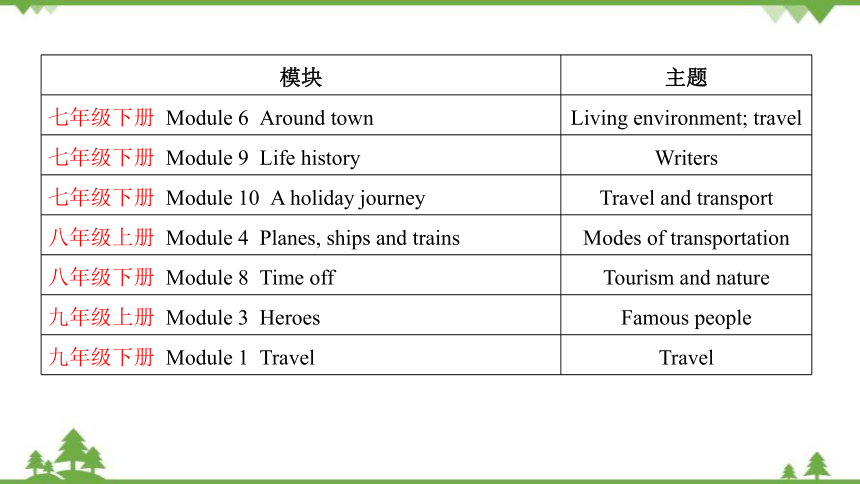
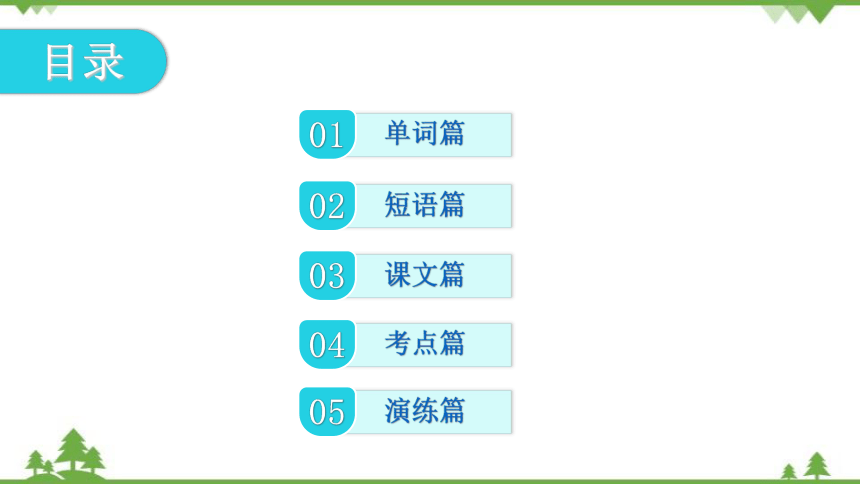
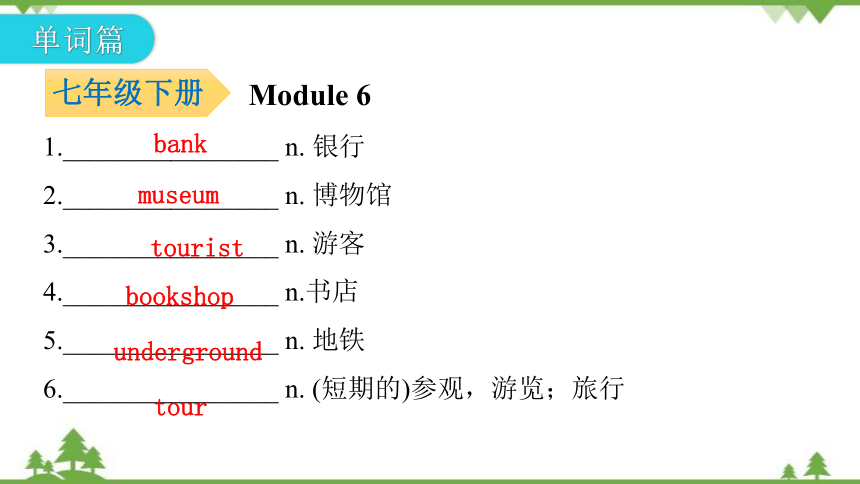
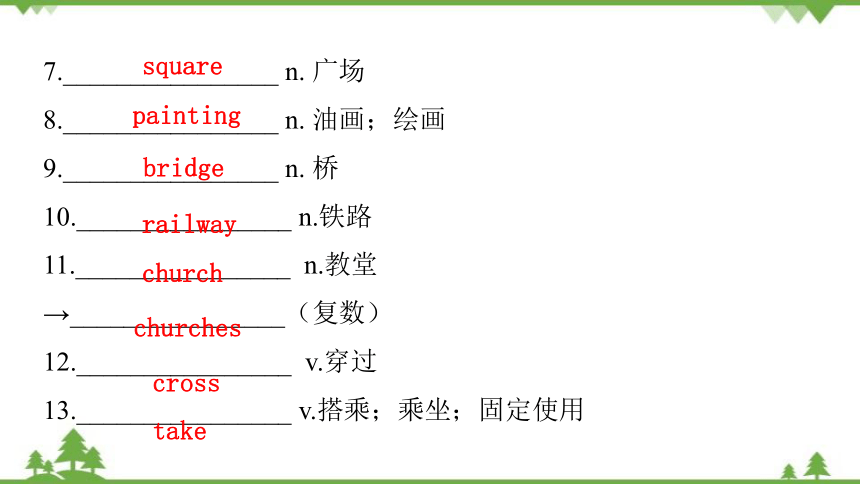
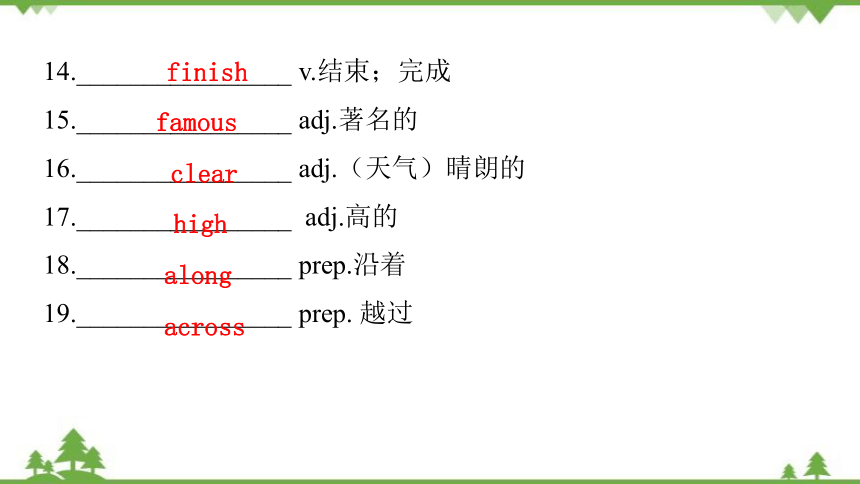

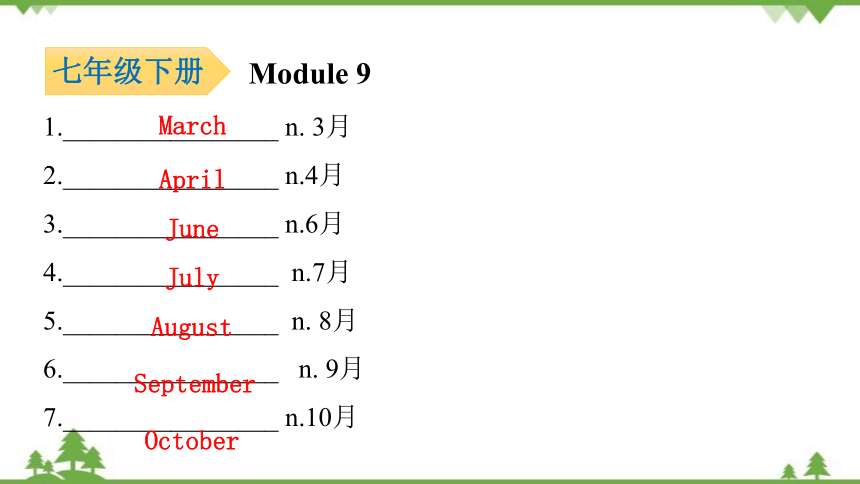
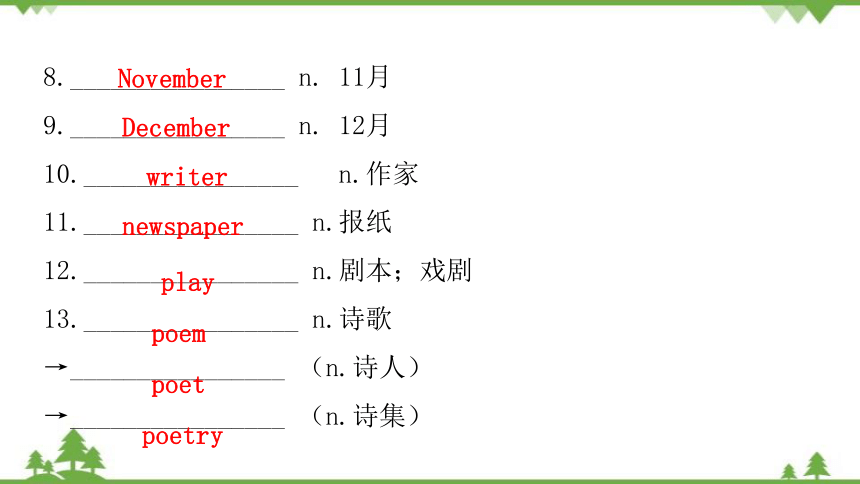
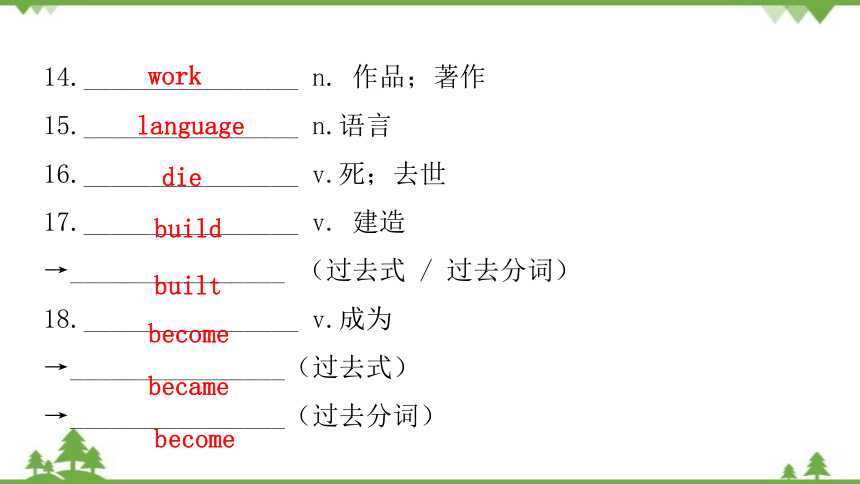
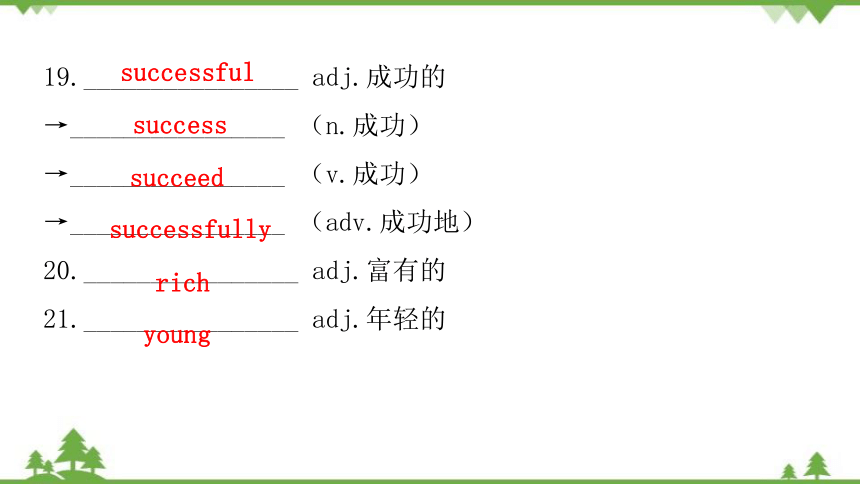
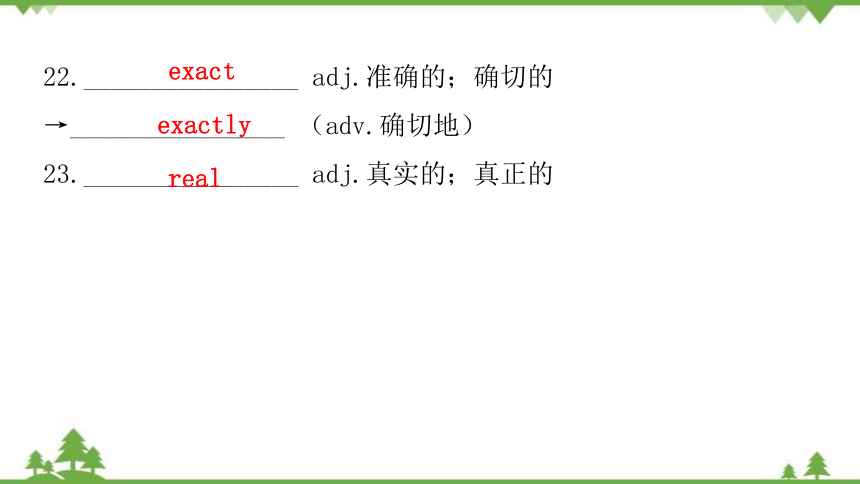
文档简介
(共86张PPT)
教材梳理(WY)
话题七 旅游与交通、历史与社会
模块 主题
七年级下册 Module 6 Around town Living environment; travel
七年级下册 Module 9 Life history Writers
七年级下册 Module 10 A holiday journey Travel and transport
八年级上册 Module 4 Planes, ships and trains Modes of transportation
八年级下册 Module 8 Time off Tourism and nature
九年级上册 Module 3 Heroes Famous people
九年级下册 Module 1 Travel Travel
目录
01
单词篇
02
短语篇
03
课文篇
04
考点篇
05
演练篇
单词篇
七年级下册
Module 6
1.________________ n. 银行
2.________________ n. 博物馆
3.________________ n. 游客
4.________________ n.书店
5.________________ n. 地铁
6.________________ n. (短期的)参观,游览;旅行
bank
museum
tourist
bookshop
underground
tour
7.________________ n. 广场
8.________________ n. 油画;绘画
9.________________ n. 桥
10.________________ n.铁路
11.________________ n.教堂
→________________(复数)
12.________________ v.穿过
13.________________ v.搭乘;乘坐;固定使用
square
painting
bridge
railway
church
churches
cross
take
14.________________ v.结束;完成
15.________________ adj.著名的
16.________________ adj.(天气)晴朗的
17.________________ adj.高的
18.________________ prep.沿着
19.________________ prep. 越过
finish
famous
clear
high
along
across
20.________________ prep.在……的对面
21.________________ prep.在……上方;在……之上
22.________________ num.第三
→________________(基数词)
opposite
above
third
three
1.________________ n. 3月
2.________________ n.4月
3.________________ n.6月
4.________________ n.7月
5.________________ n. 8月
6.________________ n. 9月
7.________________ n.10月
七年级下册
Module 9
March
April
June
July
August
September
October
8.________________ n. 11月
9.________________ n. 12月
10.________________ n.作家
11.________________ n.报纸
12.________________ n.剧本;戏剧
13.________________ n.诗歌
→________________ (n.诗人)
→________________ (n.诗集)
November
December
writer
newspaper
play
poem
poet
poetry
14.________________ n. 作品;著作
15.________________ n.语言
16.________________ v.死;去世
17.________________ v. 建造
→________________ (过去式 / 过去分词)
18.________________ v.成为
→________________(过去式)
→________________(过去分词)
work
language
die
build
built
become
became
become
19.________________ adj.成功的
→________________ (n.成功)
→________________ (v.成功)
→________________ (adv.成功地)
20.________________ adj.富有的
21.________________ adj.年轻的
successful
success
succeed
successfully
rich
young
22.________________ adj.准确的;确切的
→________________ (adv.确切地)
23.________________ adj.真实的;真正的
exact
exactly
real
1.________________ v. 猜;猜测
2.________________ v. 到达
3.________________ v. 放松
→________________ (adj.放松的;自在的)
→________________ (adj.令人放松的)
4.________________ v. 卖;出售
→________________(过去式 / 过去分词)
七年级下册
Module 10
guess
arrive
relax
relaxed
relaxing
sell
sold
5.________________ adj. 绝妙的;了不起的
6.________________ adj. 激动的;兴奋的
→________________ (adj.令人激动的)
→________________ (n.激动)
7.________________ adj. 举世闻名的
8.________________ adv. 那么;这么
9.________________ conj.直到……为止
wonderful
excited
exciting
excitement
world-famous
so
till
1.________________ n. 路;(尤指)公路
2.________________ n. 交通事故;意外事件
3.________________ n.选择
→________________ (v. 选择)
4.________________ n.旅行;旅程
5.________________ v.预订
八年级上册
Module 4
road
accident
choice
choose
journey
book
6.________________ v.价钱为;花费n.价钱
→________________ (过去式 / 过去分词)
7.________________ adj. 近的,接近的adv. 接近地
8.________________ adj.拥挤的;人数过多的
9.________________ adv. 远;遥远adj. 远的;遥远的
→________________(比较级)
→________________(最高级)
cost
cost
close
crowded
far
farther / further
farthest / furthest
10.________________ adv. 然而;但是
11.________________ prep.除……之外
12.________________ prep.在……之外
however
except
outside
1.________________ n. 外形;形状
2.________________ n.小路;路径
3.________________ n.[用复数]风景;名胜
4.________________ v.浪费;滥用n.浪费;滥用
5.________________ v.唤醒;醒来
→________________ (过去式)
→________________(过去分词)
八年级下册
Module 8
shape
path
sights
waste
wake
woke
woken
6. ________________ v. (用手)拉,牵,扯
7. ________________ adj.渴的
8. ________________ adv.几乎不;几乎没
9. ________________ adv. 向四周;向各处
10. ________________ pron.某人;有人
pull
thirsty
hardly
about
somebody
1.________________ n. 加拿大
2.________________ n.奖牌;奖章
3.________________ n.意志;决心
4.________________ n. 军人;士兵
5.________________ n. 战争
6.________________ n. 伤;伤口
→________________ (adj.受伤的)
九年级上册
Module 3
Canada
medal
will
soldier
war
wound
wounded
7.________________ n.照顾;照料
→________________ (adj.小心的)
→________________ (adj.小心地)
8.________________ n. 工具;器械
9.________________ n. 发明;发明物
→________________ (v.发明)
→________________ (n.发明家)
10.________________ n.手术
care
careful
carefully
tool
invention
invent
inventor
operation
11.________________ v. 上(学);出席;参加
12.________________ v. 了解;意识到
13.________________ v.(使)继续
14.________________ adj.惊人的;极好的
15.________________ adj.加拿大的;加拿大人的
16.________________ adj. (感觉)不适的,生病的
17.________________ adj.垂死的;即将死亡的
attend
realise
continue
amazing
Canadian
sick
dying
18.________________ adj.有用的;有益的
→________________ (v.使用)
→________________ (adj.无用的)
19.________________ adv.在国外;到国外
20.________________ prep.包含;包括
21.________________ pron.他自己
useful
use
useless
abroad
including
himself
1.________________ n. 航班;飞行
→________________ (v.飞行)
2.________________ n.飞行员
3.________________ n.军官;官员;警察
→________________ (n.办公室)
九年级下册
Module 1
flight
fly
pilot
officer
office
4.________________ n.短上衣;夹克
5.________________ v.成功;做成
6.________________ adv.确切地;完全
7.________________ adv.径直地;直接地
jacket
succeed
exactly
direct
短语篇
七年级下册
Module 6
1.劳驾;对不起 ________________
2.邮政局________________
3.为什么不……呢? ________________
4.在晴朗的一天 ____________________
5.去……的路 ________________
6.沿着街道直走 ____________________
excuse me
post office
Why not …
on a clear day
the way to
go along the street
七年级下册
Module 9
1.妇女节 ________________
2.国庆节 ________________
3.儿童节 ________________
4.世界各地 ____________________
Women’s Day
National Day
Children’s Day
around the world
5.在……岁时 ________________
6.在19世纪60年代 ________________
7.发现;查明;弄清 ________________
8.值得做某事 _______________________
at the age of
in the 1860s
find out
be worth doing sth.
七年级下册
Module 10
1.开车送某人去…… ________________
2.前天 ___________________________
3.散步 ________________
4.排队________________
drive sb. to …
the day before yesterday
take a walk
wait in line
5.乘坐地铁 ________________________
6.艺术品 ________________
7.在度假 ________________
8.乘船游览 ______________________
take the underground
works of art
on holiday
take a boat tour
八年级上册
Module 4
1.远离 ________________
2.一直;不断地 ________________
3.计划做某事 __________________________
4.贵得多 __________________________
far from
all the time
plan to do sth.
a lot more expensive
5.有点儿 ________________
6.旅途愉快 __________________________
7.拥挤的交通 __________________________
8.迟到 ________________
a bit
have a great trip
heavy traffic
be late for
八年级下册
Module 8
1.占去(时间或空间) ________________
2.指出;指明 ________________
3.在……的顶端 _________________
4.唤醒某人 ___________________
take up
point out
at the top of …
wake sb. up
5.答应做某事 __________________________
6.没有发出任何声音 _________________________
7.看起来像 _________________
8.玩得愉快 _________________________
promise to do sth.
without making any noise
look like
have a wonderful time
九年级上册
Module 3
1.再一次 ________________
2.放弃(努力)________________
3.为……而死 ________________
4.照顾;护理 ________________
once again
give up
die for
take care of
5.那时候 ________________
6.独自一人 ________________
7.死于…… ________________
8.设法完成某事 ____________________
at that time
on one’s own
die of
manage to do sth.
九年级下册
Module 1
1.因为;由于 ________________
2.只要 ________________
3.(告别用语)多保重 ________________
4.脱去 ________________
because of
as long as
take care
take off
5.坐错座位 ________________________
6.稍等一下 ________________________
7.成功地做…… ________________________
8.把某物准备好 ________________________
take the wrong seat
wait a moment
succeed in doing …
have sth. ready
七年级下册
Module 6
1.您能告诉我王府井大街怎么走吗?
________________________________________________
2.当你很疲惫的时候,游览伦敦最好的方式是坐船。
_____________________________________________________
课文篇
Could you tell me the way to Wangfujing Dajie
When you are tired, the best way to see London is by boat.
3.参观完伦敦塔之后,沿着河坐船回到火车站。
After visiting the Tower of London, _______________________
_________________to the railway station.
4.穿过东长安街,沿着这条街道走,在左边的第三条街道向左拐。
________________ Dong Chang’an Jie, ________________ the street and _______________________________ on the left.
take the boat back along the river
Go across
go along
turn left at the third street
七年级下册
Module 9
1.他12岁时离开学校并开始工作。
________________________________________________
2.他成了一名成功的演员,并开始写戏剧。
________________________________________________
He left school and began work at the age of twelve.
He became a successful actor and began to write plays.
3.像400年前的许多人一样,莎士比亚的父母不识字。
______________________________, Shakespeare’s parents didn’t learn to read or write.
4.在学校时他喜欢戏剧,所以在14岁毕业的时候他决定当一名演员。
At school he liked plays, so he ____________________ when he _______________________________.
Like many people 400 years ago
decided to be an actor
finished school at fourteen
七年级下册
Module 10
1.去那里花了多长时间?
_____________________________________________________
2.我们一直等到所有的灯都亮了。
_____________________________________________________
3.我们的朋友来接我们并开车送我们去他们家。
_____________________________________________________
How long did it take to get there
We waited till all the lights were on.
Our friends met us and drove us to their home.
4.下午三点左右我们乘巴黎地铁去了埃菲尔铁塔。
_______________________________________________
_____________________________________________
At about three o’clock, we took the Paris Underground
to the Eiffel Tower.
八年级上册
Module 4
1.信息越多越好。
________________________________________________
2.他住得离学校最远。
________________________________________________
3.到达那里你要花费大约12个小时。
________________________________________________
The more information, the better.
He lives the farthest from school.
It takes you about twelve hours to get there.
4.这是最舒适的旅行方式,但也是最昂贵的。
This is the most comfortable way to travel __________________.
5.因为天气恶劣,你可能需要在机场等上数小时。
You may ____________________________ at the airport __________________________________.
but also the most expensive
have to wait for hours
because of bad weather
八年级下册
Module 8
1.湖占据了这个公园一半多的面积。
_____________________________________________
2.我们认为是有人在四处走动。
_____________________________________________
3.我觉得他们不允许人们在这个湖里游泳。
_____________________________________________
The lake takes up over half of the park area.
We thought somebody was moving about.
I don’t think they allow people to swim in the lake.
4.有的(石头)看起来像人,而有的看起来像野生动物。
Some of them look like humans ___________________________.
while others look like wild animals
九年级上册
Module 3
1.无论做什么,她都不放弃!
____________________________________________________
2.她在很多世界级比赛中获胜,包括获得四枚奥运会金牌。
She’s won many world competitions, ______________________
____________________________________________________.
Whatever she does, she never gives up!
including four gold medals
in the Olympics
3.她是我心目中的英雄,因为她是世界上最优秀的乒乓球运动员之一。
She’s my hero because __________________________________ in the world.
4.我觉得她不仅是一个出色的运动员,而且还是一个好学生。
I think she’s a good student _________________________.
she’s one of the best table tennis players
as well as a good player
九年级下册
Module 1
1.请大家准备好车票。
_____________________________________________________
2.飞行员成功地按时着陆了。
_____________________________________________________
3.只要你努力,没什么好担心的。
_____________________________________________________
Please have your ticket ready.
The pilot succeeded in landing on time.
There’s nothing to worry about as long as you work hard.
考点1
方位的表达方式【七年级下册 Module 6】
专练 根据汉语意思完成句子,词数不限
1.树在房子的前面。
The trees are ________________ the house.
2.银行在电影院的左边。
The bank is ________________ the cinema.
考点篇
in front of
on the left of
3.在公园和学校之间有一家餐馆。
There is a restaurant ___________ the park _________ the school.
点拨 in front of意为“在……的前面”;between … and … 意为“在……和……之间”;on the left / right of … 意为“在……的左边 / 右边”。
between
and
考点2
一般过去时(3)【七年级下册 Module 9】
专练
Last Sunday,it _1_ sunny.My father _2_ my sister Emily and me to Hong Kong Museum of History.The museum is in Kowloon Park.We also _3_ to the swimming pool in the park. Emily and I _4_ for two hours in the pool. We felt relaxed and happy on that day.
was
took
went
swam
( )1.A.is B.was C.are D.were
( )2.A.taked B.takes C.took D.taking
( )3.A.go B.going C.went D.goed
( )4.A.swimmed B.swimming C.swims D.swam
B
C
C
D
点拨 规则动词变过去式,通常是直接在动词原形后加-ed或者-d。但有些动词并不遵循这一规则,我们称之为不规则动词。
考点3
一般过去时(4)【七年级下册 Module 10】
专练
( )1.—________ —We went there by car.
A.How do you get there B.How you got there
C.How did you got there D.How did you get there
D
( )2.—Where ________ your sister ________ last holiday
—She went to Yunnan.
A. are; going B. does; go C. will; go D. did; go
( )3.—________ did you have a party —Last night.
A. What B. Who C. When D.Where
D
C
点拨 一般过去时的特殊疑问句的构成:(1)疑问词+was / were+主语+其他?(2)疑问词+did+主语+动词原形+其他?
考点4
形容词、副词的最高级【八年级上册 Module 4】
专练
( )1.High-speed trains travel ________ of all kinds of trains in China, so more and more people choose to travel by them.
A. fast B. faster C. fastest D. most fastest
C
( )2.—Did you have a wonderful time at the party last night
—Yes, it’s ________ one I have ever been to.
A. exciting B. more exciting
C. the most exciting D. most exciting
( )3.We all think Mrs Green sings ______ among the members in the group.
A.more beautifully B.most beautifully
C.more beautiful D.most beautiful
C
B
点拨 形容词和副词的最高级的规则变化:单音节词的末尾加-est,某些双音节和多音节词前加most。不规则变化需要特别记忆,如:good / well→best,bad / ill / badly→worst,far→farthest / furthest。
考点5
that引导的宾语从句【八年级下册 Module 8】
专练 把下列两个句子连接成含有宾语从句的主从复合句
1.There will be a speech competition next week. Our teacher says.
__________________________________________________________________________________________________________
2.He can win the match. I hope.
_____________________________________________________
Our teacher says(that) there will be a speech competition next week.
I hope(that) he can win the match.
3.He wants to travel to Xi’an. He tells me.
_____________________________________________________
点拨 常接that引导的宾语从句的谓语动词有:say, hope, tell, think, wish等。that没有任何词汇意义,只具有语法功能,多数情况下that可以省略。
He tells me(that)he wants to travel to Xi’an.
考点6
状语从句(2):原因、目的和结果状语从句【九年级上册 Module 3】
专练 选择because, so或so that填空
1.My cousin Jeff bought a computer __________ he could work at home.
2.They play football every day ________________ they want to become football players in the future.
3.The train was late, _________we had to wait for half an hour.
so that
because
so
点拨 because意为“因为”,引导原因状语从句;so意为“所以”,引导结果状语从句;so that意为“以便”,引导目的状语从句。
考点7
名词、冠词、数词【九年级下册 Module 1】
专练
( )1. I am looking forward to the summer holiday. We’re going to take ________ trip to ________ Paris.
A. an; the B. an; / C. a; the D. a; /
D
( )2.—What would you like to eat —________, please.
A.Two bowls of noodle B.Two bowl of noodles
C.Two bowls of rice D.Two bowls of rices
( )3.—It’s really hot today.What drinks do we have in the fridge
—We have some ________.
A.lemonade B.cheese C.sausages D.hamburger
C
A
点拨 详解见主书第一部分“第一节 冠词”“第二节 名词”及“第三节 数词”。
演练篇
一、语法选择
John and Amy both had very busy jobs and didn’t have enough time to spend with _1_ young children. They wanted to change this.Because their hobby was _2_, they decided to sail around the world together.
It took six years _3_ everything for the trip.Finally, they bought _4_ new boat.Then, both the parents had to take sailing
their
boating
to prepare
a
lessons and learn all _5_ the sea and the weather. John also learnt _6_ to repair a boat and Amy spent some hours learning to cook fish.
In October, they _7_ away from England with their two children.The next year, in August, their long trip ended in Australia.
The boat was quite small, _8_ they still took a teacher for the children. _9_ of them found the trip boring because there were three computers, many CDs, and a DVD player on the boat.
about
how
sailed
but
None
The family loved being at the sea and _10_ the stars in the sky.But what John and Amy enjoyed most was to spend time with their children when they were still young.
seeing
( )1.A.they B.them C.their D.theirs
( )2.A.boat B.boats C.boated D.boating
( )3.A.prepare B.to prepare C.preparing D.prepared
( )4.A.a B.an C.the D./
( )5.A.of B.in C.about D.with
C
D
B
A
C
( )6.A.how B.what C.why D.where
( )7.A.sail B.sailed
C.will sail D.are sailing
( )8.A.and B.but C.so D.or
( )9.A.Both B.All C.Neither D.None
( )10.A.see B.seeing C.saw D.seen
A
B
B
D
B
二、阅读理解(A篇)
Third monthly culture lecture
Fun for children in ancient China
Dr. Caroline Yang
7 pm, Thursday, 9th July 2021
(Biscuits and drinks will be served.)
During ancient times, children didn’t have much to enjoy themselves. However, they came up with interesting games to play in their childhood.
续表
Kicking stone balls
During the Qing Dynasty, kicking a stone ball was a popular game in the northern part of China, and it was often played in winter to keep warm.
Playing hide-and-seek
Hide-and-seek is a traditional game for children, popular around the nation.The way to play it is covering a child’s eyes while other kids run around to hide and the child must try to find them after he opens his eyes.
续表
Flying kites
Kites have quite a long history.The earliest kites were made of wood instead of paper.The three most famous kites are the Beijing kite, Tianjin kite and Weifang kite.Each has its own feature.For example, the bird-shaped kite with long wings is a special kind of the Beijing kite.
续表
( )11.Such a culture lecture is held once ________.
A.a week B.a month C.a season D.a year
Watching shadow plays
The closest thing to watching a film during ancient times was going to see a shadow play.The artists control puppets(木偶)behind the screen and tell stories to the music.
B
( )12.Kicking stone balls was popular in North China maybe because ________.
A.winter there was cold
B.people there were poor
C.stones could be easily found there
D.children there were strong
A
( )13.During ancient times, children flew ________.
A.paper birds B.bamboo kites
C.wooden kites D.wooden wings
( )14.A shadow play in ancient times is similar to ________ in modern times.
A.a film B.a kite show
C.a hide-and-seek game D.a toy for children
C
A
( )15.This lecture is about ________ in ancient China.
A.what subjects children learnt
B.where children flew their kites
C.why many things were different
D.how children enjoyed themselves
D
三、短文填空
Thousands of years ago, humans didn’t live in towns.Sometimes they would live in caves or build camps in the forest.
Only about thirty people _16_ in each camp.The men would go hunting while the women and children _17_ food from the trees around the camp.All the food was _18_ among everyone in the
lived
collected
shared
group.Every few weeks they moved to another place to find more food.It was a simple life, but people had to be clever.They had to make everything they needed, and they had to know a _19_ about plants and animals.
Nowadays, most people live in towns and cities, and they work in offices and factories.Life is _20_ than it used to be.There are fewer dangers, _21_ there is less excitement too.Some people
lot
easier / better
but
go looking _22_ excitement—sailing round the world, climbing mountains, or exploring caves.Most people look forward to a _23_, the time when they can take a rest and enjoy a change from their normal life.For some this means going camping.But camping today is _24_ from that in the past.Gas cookers, ready-made food and airbeds mean people can camp much more _25_ than they did in the old days.
for
holiday
different
comfortably / easily
16.______________ 17.______________
18.______________ 19.______________
20.______________ 21.______________
22.______________ 23.______________
24.______________ 25.______________
lived
collected
shared
lot
easier / better
but
for
holiday
different
comfortably / easily
谢 谢!
教材梳理(WY)
话题七 旅游与交通、历史与社会
模块 主题
七年级下册 Module 6 Around town Living environment; travel
七年级下册 Module 9 Life history Writers
七年级下册 Module 10 A holiday journey Travel and transport
八年级上册 Module 4 Planes, ships and trains Modes of transportation
八年级下册 Module 8 Time off Tourism and nature
九年级上册 Module 3 Heroes Famous people
九年级下册 Module 1 Travel Travel
目录
01
单词篇
02
短语篇
03
课文篇
04
考点篇
05
演练篇
单词篇
七年级下册
Module 6
1.________________ n. 银行
2.________________ n. 博物馆
3.________________ n. 游客
4.________________ n.书店
5.________________ n. 地铁
6.________________ n. (短期的)参观,游览;旅行
bank
museum
tourist
bookshop
underground
tour
7.________________ n. 广场
8.________________ n. 油画;绘画
9.________________ n. 桥
10.________________ n.铁路
11.________________ n.教堂
→________________(复数)
12.________________ v.穿过
13.________________ v.搭乘;乘坐;固定使用
square
painting
bridge
railway
church
churches
cross
take
14.________________ v.结束;完成
15.________________ adj.著名的
16.________________ adj.(天气)晴朗的
17.________________ adj.高的
18.________________ prep.沿着
19.________________ prep. 越过
finish
famous
clear
high
along
across
20.________________ prep.在……的对面
21.________________ prep.在……上方;在……之上
22.________________ num.第三
→________________(基数词)
opposite
above
third
three
1.________________ n. 3月
2.________________ n.4月
3.________________ n.6月
4.________________ n.7月
5.________________ n. 8月
6.________________ n. 9月
7.________________ n.10月
七年级下册
Module 9
March
April
June
July
August
September
October
8.________________ n. 11月
9.________________ n. 12月
10.________________ n.作家
11.________________ n.报纸
12.________________ n.剧本;戏剧
13.________________ n.诗歌
→________________ (n.诗人)
→________________ (n.诗集)
November
December
writer
newspaper
play
poem
poet
poetry
14.________________ n. 作品;著作
15.________________ n.语言
16.________________ v.死;去世
17.________________ v. 建造
→________________ (过去式 / 过去分词)
18.________________ v.成为
→________________(过去式)
→________________(过去分词)
work
language
die
build
built
become
became
become
19.________________ adj.成功的
→________________ (n.成功)
→________________ (v.成功)
→________________ (adv.成功地)
20.________________ adj.富有的
21.________________ adj.年轻的
successful
success
succeed
successfully
rich
young
22.________________ adj.准确的;确切的
→________________ (adv.确切地)
23.________________ adj.真实的;真正的
exact
exactly
real
1.________________ v. 猜;猜测
2.________________ v. 到达
3.________________ v. 放松
→________________ (adj.放松的;自在的)
→________________ (adj.令人放松的)
4.________________ v. 卖;出售
→________________(过去式 / 过去分词)
七年级下册
Module 10
guess
arrive
relax
relaxed
relaxing
sell
sold
5.________________ adj. 绝妙的;了不起的
6.________________ adj. 激动的;兴奋的
→________________ (adj.令人激动的)
→________________ (n.激动)
7.________________ adj. 举世闻名的
8.________________ adv. 那么;这么
9.________________ conj.直到……为止
wonderful
excited
exciting
excitement
world-famous
so
till
1.________________ n. 路;(尤指)公路
2.________________ n. 交通事故;意外事件
3.________________ n.选择
→________________ (v. 选择)
4.________________ n.旅行;旅程
5.________________ v.预订
八年级上册
Module 4
road
accident
choice
choose
journey
book
6.________________ v.价钱为;花费n.价钱
→________________ (过去式 / 过去分词)
7.________________ adj. 近的,接近的adv. 接近地
8.________________ adj.拥挤的;人数过多的
9.________________ adv. 远;遥远adj. 远的;遥远的
→________________(比较级)
→________________(最高级)
cost
cost
close
crowded
far
farther / further
farthest / furthest
10.________________ adv. 然而;但是
11.________________ prep.除……之外
12.________________ prep.在……之外
however
except
outside
1.________________ n. 外形;形状
2.________________ n.小路;路径
3.________________ n.[用复数]风景;名胜
4.________________ v.浪费;滥用n.浪费;滥用
5.________________ v.唤醒;醒来
→________________ (过去式)
→________________(过去分词)
八年级下册
Module 8
shape
path
sights
waste
wake
woke
woken
6. ________________ v. (用手)拉,牵,扯
7. ________________ adj.渴的
8. ________________ adv.几乎不;几乎没
9. ________________ adv. 向四周;向各处
10. ________________ pron.某人;有人
pull
thirsty
hardly
about
somebody
1.________________ n. 加拿大
2.________________ n.奖牌;奖章
3.________________ n.意志;决心
4.________________ n. 军人;士兵
5.________________ n. 战争
6.________________ n. 伤;伤口
→________________ (adj.受伤的)
九年级上册
Module 3
Canada
medal
will
soldier
war
wound
wounded
7.________________ n.照顾;照料
→________________ (adj.小心的)
→________________ (adj.小心地)
8.________________ n. 工具;器械
9.________________ n. 发明;发明物
→________________ (v.发明)
→________________ (n.发明家)
10.________________ n.手术
care
careful
carefully
tool
invention
invent
inventor
operation
11.________________ v. 上(学);出席;参加
12.________________ v. 了解;意识到
13.________________ v.(使)继续
14.________________ adj.惊人的;极好的
15.________________ adj.加拿大的;加拿大人的
16.________________ adj. (感觉)不适的,生病的
17.________________ adj.垂死的;即将死亡的
attend
realise
continue
amazing
Canadian
sick
dying
18.________________ adj.有用的;有益的
→________________ (v.使用)
→________________ (adj.无用的)
19.________________ adv.在国外;到国外
20.________________ prep.包含;包括
21.________________ pron.他自己
useful
use
useless
abroad
including
himself
1.________________ n. 航班;飞行
→________________ (v.飞行)
2.________________ n.飞行员
3.________________ n.军官;官员;警察
→________________ (n.办公室)
九年级下册
Module 1
flight
fly
pilot
officer
office
4.________________ n.短上衣;夹克
5.________________ v.成功;做成
6.________________ adv.确切地;完全
7.________________ adv.径直地;直接地
jacket
succeed
exactly
direct
短语篇
七年级下册
Module 6
1.劳驾;对不起 ________________
2.邮政局________________
3.为什么不……呢? ________________
4.在晴朗的一天 ____________________
5.去……的路 ________________
6.沿着街道直走 ____________________
excuse me
post office
Why not …
on a clear day
the way to
go along the street
七年级下册
Module 9
1.妇女节 ________________
2.国庆节 ________________
3.儿童节 ________________
4.世界各地 ____________________
Women’s Day
National Day
Children’s Day
around the world
5.在……岁时 ________________
6.在19世纪60年代 ________________
7.发现;查明;弄清 ________________
8.值得做某事 _______________________
at the age of
in the 1860s
find out
be worth doing sth.
七年级下册
Module 10
1.开车送某人去…… ________________
2.前天 ___________________________
3.散步 ________________
4.排队________________
drive sb. to …
the day before yesterday
take a walk
wait in line
5.乘坐地铁 ________________________
6.艺术品 ________________
7.在度假 ________________
8.乘船游览 ______________________
take the underground
works of art
on holiday
take a boat tour
八年级上册
Module 4
1.远离 ________________
2.一直;不断地 ________________
3.计划做某事 __________________________
4.贵得多 __________________________
far from
all the time
plan to do sth.
a lot more expensive
5.有点儿 ________________
6.旅途愉快 __________________________
7.拥挤的交通 __________________________
8.迟到 ________________
a bit
have a great trip
heavy traffic
be late for
八年级下册
Module 8
1.占去(时间或空间) ________________
2.指出;指明 ________________
3.在……的顶端 _________________
4.唤醒某人 ___________________
take up
point out
at the top of …
wake sb. up
5.答应做某事 __________________________
6.没有发出任何声音 _________________________
7.看起来像 _________________
8.玩得愉快 _________________________
promise to do sth.
without making any noise
look like
have a wonderful time
九年级上册
Module 3
1.再一次 ________________
2.放弃(努力)________________
3.为……而死 ________________
4.照顾;护理 ________________
once again
give up
die for
take care of
5.那时候 ________________
6.独自一人 ________________
7.死于…… ________________
8.设法完成某事 ____________________
at that time
on one’s own
die of
manage to do sth.
九年级下册
Module 1
1.因为;由于 ________________
2.只要 ________________
3.(告别用语)多保重 ________________
4.脱去 ________________
because of
as long as
take care
take off
5.坐错座位 ________________________
6.稍等一下 ________________________
7.成功地做…… ________________________
8.把某物准备好 ________________________
take the wrong seat
wait a moment
succeed in doing …
have sth. ready
七年级下册
Module 6
1.您能告诉我王府井大街怎么走吗?
________________________________________________
2.当你很疲惫的时候,游览伦敦最好的方式是坐船。
_____________________________________________________
课文篇
Could you tell me the way to Wangfujing Dajie
When you are tired, the best way to see London is by boat.
3.参观完伦敦塔之后,沿着河坐船回到火车站。
After visiting the Tower of London, _______________________
_________________to the railway station.
4.穿过东长安街,沿着这条街道走,在左边的第三条街道向左拐。
________________ Dong Chang’an Jie, ________________ the street and _______________________________ on the left.
take the boat back along the river
Go across
go along
turn left at the third street
七年级下册
Module 9
1.他12岁时离开学校并开始工作。
________________________________________________
2.他成了一名成功的演员,并开始写戏剧。
________________________________________________
He left school and began work at the age of twelve.
He became a successful actor and began to write plays.
3.像400年前的许多人一样,莎士比亚的父母不识字。
______________________________, Shakespeare’s parents didn’t learn to read or write.
4.在学校时他喜欢戏剧,所以在14岁毕业的时候他决定当一名演员。
At school he liked plays, so he ____________________ when he _______________________________.
Like many people 400 years ago
decided to be an actor
finished school at fourteen
七年级下册
Module 10
1.去那里花了多长时间?
_____________________________________________________
2.我们一直等到所有的灯都亮了。
_____________________________________________________
3.我们的朋友来接我们并开车送我们去他们家。
_____________________________________________________
How long did it take to get there
We waited till all the lights were on.
Our friends met us and drove us to their home.
4.下午三点左右我们乘巴黎地铁去了埃菲尔铁塔。
_______________________________________________
_____________________________________________
At about three o’clock, we took the Paris Underground
to the Eiffel Tower.
八年级上册
Module 4
1.信息越多越好。
________________________________________________
2.他住得离学校最远。
________________________________________________
3.到达那里你要花费大约12个小时。
________________________________________________
The more information, the better.
He lives the farthest from school.
It takes you about twelve hours to get there.
4.这是最舒适的旅行方式,但也是最昂贵的。
This is the most comfortable way to travel __________________.
5.因为天气恶劣,你可能需要在机场等上数小时。
You may ____________________________ at the airport __________________________________.
but also the most expensive
have to wait for hours
because of bad weather
八年级下册
Module 8
1.湖占据了这个公园一半多的面积。
_____________________________________________
2.我们认为是有人在四处走动。
_____________________________________________
3.我觉得他们不允许人们在这个湖里游泳。
_____________________________________________
The lake takes up over half of the park area.
We thought somebody was moving about.
I don’t think they allow people to swim in the lake.
4.有的(石头)看起来像人,而有的看起来像野生动物。
Some of them look like humans ___________________________.
while others look like wild animals
九年级上册
Module 3
1.无论做什么,她都不放弃!
____________________________________________________
2.她在很多世界级比赛中获胜,包括获得四枚奥运会金牌。
She’s won many world competitions, ______________________
____________________________________________________.
Whatever she does, she never gives up!
including four gold medals
in the Olympics
3.她是我心目中的英雄,因为她是世界上最优秀的乒乓球运动员之一。
She’s my hero because __________________________________ in the world.
4.我觉得她不仅是一个出色的运动员,而且还是一个好学生。
I think she’s a good student _________________________.
she’s one of the best table tennis players
as well as a good player
九年级下册
Module 1
1.请大家准备好车票。
_____________________________________________________
2.飞行员成功地按时着陆了。
_____________________________________________________
3.只要你努力,没什么好担心的。
_____________________________________________________
Please have your ticket ready.
The pilot succeeded in landing on time.
There’s nothing to worry about as long as you work hard.
考点1
方位的表达方式【七年级下册 Module 6】
专练 根据汉语意思完成句子,词数不限
1.树在房子的前面。
The trees are ________________ the house.
2.银行在电影院的左边。
The bank is ________________ the cinema.
考点篇
in front of
on the left of
3.在公园和学校之间有一家餐馆。
There is a restaurant ___________ the park _________ the school.
点拨 in front of意为“在……的前面”;between … and … 意为“在……和……之间”;on the left / right of … 意为“在……的左边 / 右边”。
between
and
考点2
一般过去时(3)【七年级下册 Module 9】
专练
Last Sunday,it _1_ sunny.My father _2_ my sister Emily and me to Hong Kong Museum of History.The museum is in Kowloon Park.We also _3_ to the swimming pool in the park. Emily and I _4_ for two hours in the pool. We felt relaxed and happy on that day.
was
took
went
swam
( )1.A.is B.was C.are D.were
( )2.A.taked B.takes C.took D.taking
( )3.A.go B.going C.went D.goed
( )4.A.swimmed B.swimming C.swims D.swam
B
C
C
D
点拨 规则动词变过去式,通常是直接在动词原形后加-ed或者-d。但有些动词并不遵循这一规则,我们称之为不规则动词。
考点3
一般过去时(4)【七年级下册 Module 10】
专练
( )1.—________ —We went there by car.
A.How do you get there B.How you got there
C.How did you got there D.How did you get there
D
( )2.—Where ________ your sister ________ last holiday
—She went to Yunnan.
A. are; going B. does; go C. will; go D. did; go
( )3.—________ did you have a party —Last night.
A. What B. Who C. When D.Where
D
C
点拨 一般过去时的特殊疑问句的构成:(1)疑问词+was / were+主语+其他?(2)疑问词+did+主语+动词原形+其他?
考点4
形容词、副词的最高级【八年级上册 Module 4】
专练
( )1.High-speed trains travel ________ of all kinds of trains in China, so more and more people choose to travel by them.
A. fast B. faster C. fastest D. most fastest
C
( )2.—Did you have a wonderful time at the party last night
—Yes, it’s ________ one I have ever been to.
A. exciting B. more exciting
C. the most exciting D. most exciting
( )3.We all think Mrs Green sings ______ among the members in the group.
A.more beautifully B.most beautifully
C.more beautiful D.most beautiful
C
B
点拨 形容词和副词的最高级的规则变化:单音节词的末尾加-est,某些双音节和多音节词前加most。不规则变化需要特别记忆,如:good / well→best,bad / ill / badly→worst,far→farthest / furthest。
考点5
that引导的宾语从句【八年级下册 Module 8】
专练 把下列两个句子连接成含有宾语从句的主从复合句
1.There will be a speech competition next week. Our teacher says.
__________________________________________________________________________________________________________
2.He can win the match. I hope.
_____________________________________________________
Our teacher says(that) there will be a speech competition next week.
I hope(that) he can win the match.
3.He wants to travel to Xi’an. He tells me.
_____________________________________________________
点拨 常接that引导的宾语从句的谓语动词有:say, hope, tell, think, wish等。that没有任何词汇意义,只具有语法功能,多数情况下that可以省略。
He tells me(that)he wants to travel to Xi’an.
考点6
状语从句(2):原因、目的和结果状语从句【九年级上册 Module 3】
专练 选择because, so或so that填空
1.My cousin Jeff bought a computer __________ he could work at home.
2.They play football every day ________________ they want to become football players in the future.
3.The train was late, _________we had to wait for half an hour.
so that
because
so
点拨 because意为“因为”,引导原因状语从句;so意为“所以”,引导结果状语从句;so that意为“以便”,引导目的状语从句。
考点7
名词、冠词、数词【九年级下册 Module 1】
专练
( )1. I am looking forward to the summer holiday. We’re going to take ________ trip to ________ Paris.
A. an; the B. an; / C. a; the D. a; /
D
( )2.—What would you like to eat —________, please.
A.Two bowls of noodle B.Two bowl of noodles
C.Two bowls of rice D.Two bowls of rices
( )3.—It’s really hot today.What drinks do we have in the fridge
—We have some ________.
A.lemonade B.cheese C.sausages D.hamburger
C
A
点拨 详解见主书第一部分“第一节 冠词”“第二节 名词”及“第三节 数词”。
演练篇
一、语法选择
John and Amy both had very busy jobs and didn’t have enough time to spend with _1_ young children. They wanted to change this.Because their hobby was _2_, they decided to sail around the world together.
It took six years _3_ everything for the trip.Finally, they bought _4_ new boat.Then, both the parents had to take sailing
their
boating
to prepare
a
lessons and learn all _5_ the sea and the weather. John also learnt _6_ to repair a boat and Amy spent some hours learning to cook fish.
In October, they _7_ away from England with their two children.The next year, in August, their long trip ended in Australia.
The boat was quite small, _8_ they still took a teacher for the children. _9_ of them found the trip boring because there were three computers, many CDs, and a DVD player on the boat.
about
how
sailed
but
None
The family loved being at the sea and _10_ the stars in the sky.But what John and Amy enjoyed most was to spend time with their children when they were still young.
seeing
( )1.A.they B.them C.their D.theirs
( )2.A.boat B.boats C.boated D.boating
( )3.A.prepare B.to prepare C.preparing D.prepared
( )4.A.a B.an C.the D./
( )5.A.of B.in C.about D.with
C
D
B
A
C
( )6.A.how B.what C.why D.where
( )7.A.sail B.sailed
C.will sail D.are sailing
( )8.A.and B.but C.so D.or
( )9.A.Both B.All C.Neither D.None
( )10.A.see B.seeing C.saw D.seen
A
B
B
D
B
二、阅读理解(A篇)
Third monthly culture lecture
Fun for children in ancient China
Dr. Caroline Yang
7 pm, Thursday, 9th July 2021
(Biscuits and drinks will be served.)
During ancient times, children didn’t have much to enjoy themselves. However, they came up with interesting games to play in their childhood.
续表
Kicking stone balls
During the Qing Dynasty, kicking a stone ball was a popular game in the northern part of China, and it was often played in winter to keep warm.
Playing hide-and-seek
Hide-and-seek is a traditional game for children, popular around the nation.The way to play it is covering a child’s eyes while other kids run around to hide and the child must try to find them after he opens his eyes.
续表
Flying kites
Kites have quite a long history.The earliest kites were made of wood instead of paper.The three most famous kites are the Beijing kite, Tianjin kite and Weifang kite.Each has its own feature.For example, the bird-shaped kite with long wings is a special kind of the Beijing kite.
续表
( )11.Such a culture lecture is held once ________.
A.a week B.a month C.a season D.a year
Watching shadow plays
The closest thing to watching a film during ancient times was going to see a shadow play.The artists control puppets(木偶)behind the screen and tell stories to the music.
B
( )12.Kicking stone balls was popular in North China maybe because ________.
A.winter there was cold
B.people there were poor
C.stones could be easily found there
D.children there were strong
A
( )13.During ancient times, children flew ________.
A.paper birds B.bamboo kites
C.wooden kites D.wooden wings
( )14.A shadow play in ancient times is similar to ________ in modern times.
A.a film B.a kite show
C.a hide-and-seek game D.a toy for children
C
A
( )15.This lecture is about ________ in ancient China.
A.what subjects children learnt
B.where children flew their kites
C.why many things were different
D.how children enjoyed themselves
D
三、短文填空
Thousands of years ago, humans didn’t live in towns.Sometimes they would live in caves or build camps in the forest.
Only about thirty people _16_ in each camp.The men would go hunting while the women and children _17_ food from the trees around the camp.All the food was _18_ among everyone in the
lived
collected
shared
group.Every few weeks they moved to another place to find more food.It was a simple life, but people had to be clever.They had to make everything they needed, and they had to know a _19_ about plants and animals.
Nowadays, most people live in towns and cities, and they work in offices and factories.Life is _20_ than it used to be.There are fewer dangers, _21_ there is less excitement too.Some people
lot
easier / better
but
go looking _22_ excitement—sailing round the world, climbing mountains, or exploring caves.Most people look forward to a _23_, the time when they can take a rest and enjoy a change from their normal life.For some this means going camping.But camping today is _24_ from that in the past.Gas cookers, ready-made food and airbeds mean people can camp much more _25_ than they did in the old days.
for
holiday
different
comfortably / easily
16.______________ 17.______________
18.______________ 19.______________
20.______________ 21.______________
22.______________ 23.______________
24.______________ 25.______________
lived
collected
shared
lot
easier / better
but
for
holiday
different
comfortably / easily
谢 谢!
同课章节目录
- 词法
- 名词
- 动词和动词短语
- 动词语态
- 动词时态
- 助动词和情态动词
- 非谓语动词
- 冠词
- 代词
- 数词和量词
- 形容词副词及其比较等级
- 介词和介词短语
- 连词和感叹词
- 构词法
- 相似、相近词比较
- 句法
- 陈述句
- 一般疑问句和否定疑问句
- 特殊疑问句及选择疑问句
- 反意疑问句
- 存在句(There be句型)
- 宾语从句
- 定语从句
- 状语从句
- 主谓一致问题
- 简单句
- 并列句
- 复合句
- 主谓一致
- 主、表语从句
- 名词性从句
- 直接引语和间接引语
- 虚拟语气
- 感叹句
- 强调句
- 倒装句
- 祈使句
- 句子的成分
- 句子的分类
- 题型专区
- 单项选择部分
- 易错题
- 完形填空
- 阅读理解
- 词汇练习
- 听说训练
- 句型转换
- 补全对话
- 短文改错
- 翻译
- 书面表达
- 任务型阅读
- 语法填空
- 其他资料
